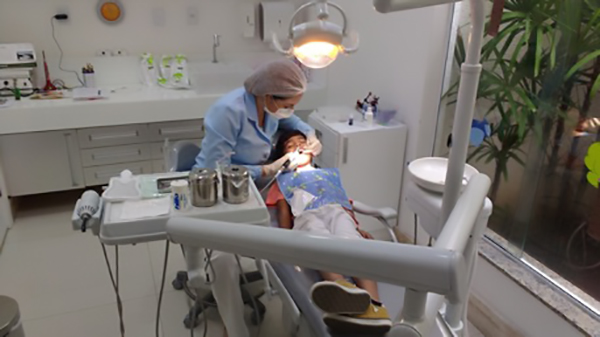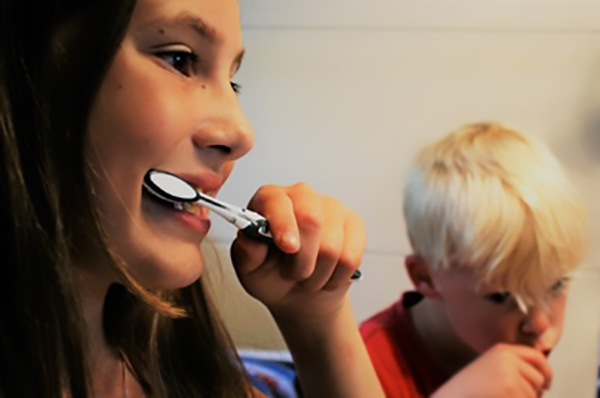How to Help Your Child with ASD Overcome Her Fear of the Dentist and Establish Lifelong Healthy Oral Hygiene Habits
September 17, 2019
For a child with Autism Spectrum Disorder (ASD), going to the dentist causes even more fear and anxiety than it does for the rest of us. The sights and sounds of an unfamiliar dental office, not to mention the prospect of sitting still while a person you don’t know probes around in your mouth, makes for an uncomfortable set of circumstances for most people. For a child who becomes overwhelmed easily or who can’t communicate well, preventive checkups can feel more like semi-annual punishments.
Fortunately, there are ways both parents and dental professionals can help children with ASD overcome their fears, get the dental care they need, and establish the healthy habits necessary to care for their teeth and gums for the rest of their lives. To do so, you must first understand the challenges children on the spectrum face, find the right dentist, and prepare your child for each visit. Here’s how.
Understand the Challenge
It’s important to remember that children with ASD are not giving you a hard time; they’re having a hard time. Outwardly, your child may appear uncooperative, non-compliant, or even aggressive. Internally, they are likely struggling to process their anxiety and fear. According to the Autism Speaks Dental Professional Tool Kit, “There are a number of behavioral and environmental techniques that may help alleviate anxiety and increase cooperation.”
To help minimize concerns and facilitate a successful visit for both you and your child, you need a plan. Knowing what to expect, as well as taking steps to reduce sensory stimuli, alleviate fears, and help your child feel supported, will help everyone relax. In the end, a trip to the dentist is an important part of every child’s overall care.
For children with ASD, however, dental healthcare can be especially important. While they are naturally no more likely to suffer from cavities or periodontal diseases than any other child, some common habits of children on the spectrum may negatively affect oral health, including:
- teeth grinding
- lip licking
- gum picking
- head banging
- pica (eating non-food items)
If your child possesses any of these habits, or if he or she has recently developed them, include this in the information you share with your dental professional before your child’s visit. They may indicate a more serious dental problem.

Find the Right Dentist
Once you understand why your child struggles with dental visits, it will be easier to find a dentist that can accommodate your child’s particular needs. Pediatric dentists are a good place to start, since they receive additional training to help them work with children. Furthermore, a pediatric dentist’s office is typically more kid-friendly. From fun decorations to kid-sized dental tools to toys in the waiting room, your child should feel more at ease.
More than likely, there are several pediatric dentists in your area. To help you figure out which of them is right for your family, there are a few steps you can take. First, ask for references from your doctor or other parents of autistic children. Online reviews and testimonials are another great resource.
Part of your decision-making process should also include talking to prospective dentists. Your discussion should touch on your child’s specific needs, as well as how the dentist is equipped to accommodate them. Suggested questions to ask include:
- Do you have experience with children with ASD?
- What procedures are in place to accommodate autistic children?
- Can I accompany my child during the visit?
- Can I see the same hygienist and dentist every visit?
- Do you use the “tell, show, do” method for communicating during the visit?
If your child also struggles with sensory issues, there are additional steps you can take to create a sensory-friendly environment. Just like at home, decreasing the amount of sensory stimuli in the environment can help your child avoid overload. Equip your son or daughter with noise-cancelling headphones and sunglasses, and ask your dental office if they can make accommodations, such as:
- Turning off music
- Keeping lights low
- Turning off non-essential equipment
- Turning down phone ringers
- Allowing your child to wait in a consultation room instead of a waiting room
- Turning off computer screensavers
- Temporarily disabling water features
While no dentist may not be able to check every box, the right dentist will try. A sincere and genuine desire to give your child the care he or she needs is key. Like so many parenting tasks, that means you have to go with your gut. Chances are, when you find the right dental office, you’ll know.
Prepare for the Visit
For many kids with Autism Spectrum Disorder, preparation is key. Knowing what to expect and having time to communicate their concerns in advance can be the difference between a positive visit and a disastrous one. A few tips:
- Tell a story. Explain what happens during a trip to the dentist visually by reading a book about the subject or creating your own story with pictures.
- Try a preliminary visit. Familiarize your child with the dental office and staff before it’s time to have any work done.
- Start early. Begin taking your child to the dentist between the ages of two and three so that there are fewer teeth to clean, giving your child more time to adapt to an easier experience.
- Take a “friend.” Let your child pick his favorite stuffed animal or comfort item to bring along.
- Schedule multiple visits. Many short visits, rather than one long one, may be easier for your child to handle.

Develop Healthy Habits
Of course, the point of all of the preparation and planning is to protect your child’s oral health. And frankly, there’s more to it than a visit to the dentist every six months. If you really want to keep your child’s mouth healthy, you have to help them establish positive daily habits as well.
Habit # 1 – Healthy Foods
Good oral health starts with healthy eating habits. Limiting sugar intake is priority number one when it comes to preventing cavities. But did you know that certain foods can actually strengthen your kids’ teeth and protect their gums? Here are some examples:
- Citrus fruits – The vitamin C in these foods helps kill bacteria in the mouth and build collagen in the gums.
- Dairy – These foods raise the pH level, lower acid levels, and reduce the risk of tooth decay.
- Raw veggies – These crisp foods mechanically clean your teeth and scrape away plaque.
- Seeds and nuts – Natural fats in these foods coat teeth to provide a barrier for bacteria.
- Sugar-free gum – Chewing gum generates saliva that loosens plaque and keeps gums hydrated.
Habit # 2 – Brushing & Flossing
Brushing and flossing are truly the foundation of a good oral-care routine, removing plaque and helping to prevent tooth decay and gum disease. However, for children with ASD, both of those tasks can be uncomfortable. Morning and evening brushing may be a battle, but you can’t give up. If your child is struggling to adopt good oral hygiene habits, consider working with an occupational therapist.
You can also try at-home tips and tricks to make brushing and flossing easier and more fun. In addition to their toolkit for professionals, Autism Speaks has a Dental Guide for families that outlines some strategies parents can use.
- Use a timer so your child can see when the task will be complete.
- Use a visual schedule. Take photos of each step of the process, and print them in order or upload them to a digital photo frame.
- Reinforce positive behavior with verbal praise or a reward.
The most important thing to remember is that each child will master these skills in their own time. Until then, consistency and persistence are key.

Habit # 3 – Regular Checkups
Many lifelong habits start when we are young, especially those involving self-care. Regular dental checkups are no exception. To help your child understand the importance of good dental health, you have to start early, make trips to the dentist a fun adventure, and model the same behavior yourself. (In other words, when you go to the dentist, make a big deal about it!)
Chances are, none of this will be easy. Alas, not much of parenting is, is it? But when it comes to “picking your battles,” prioritizing your child’s oral health is worth the fight. A healthy mouth can positively impact your children’s overall well-being and quality of life — not just when they’re young, but throughout their lives.

